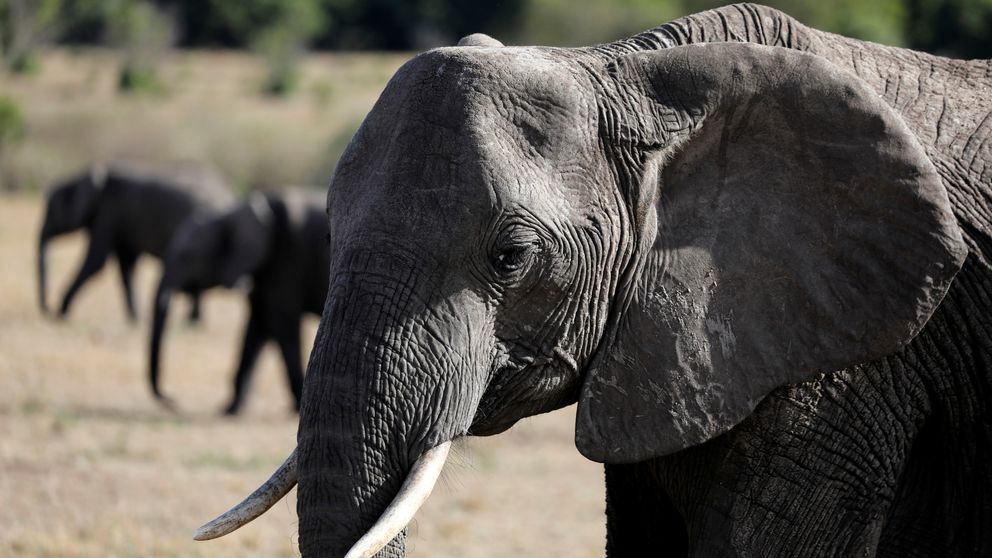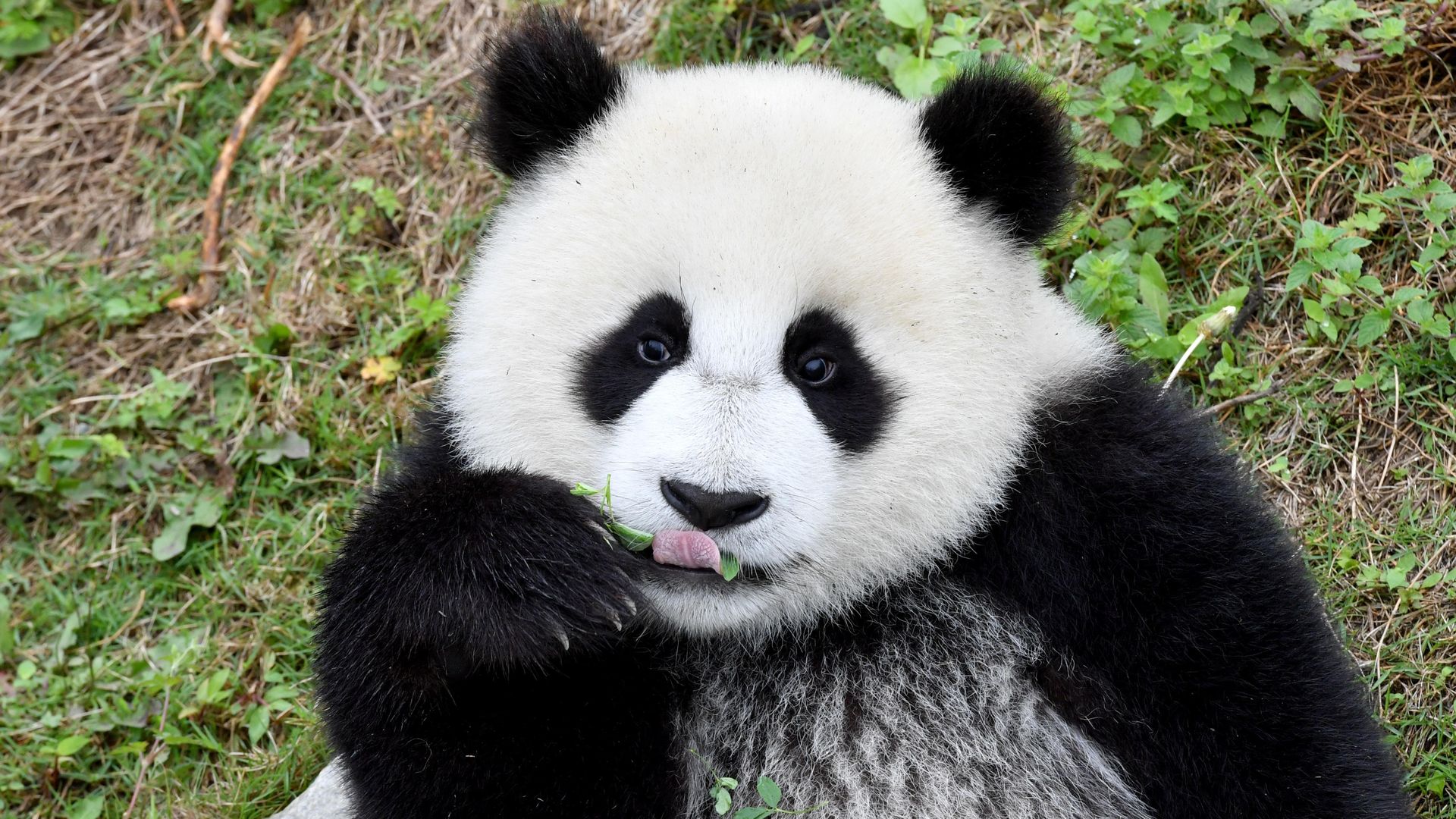How we produce and consume food is wiping out nature at an unprecedented rate, the WWF conservation group says.

Reuters
Some populations of African elephants have declined by 86% since 1976
Katie Spencer, news correspondent Published 9th Sep 2020
In its Living Planet report, the charity finds population sizes of mammals, birds, fish, amphibians and reptiles have fallen by more than two-thirds (68%) globally in the last 50 years.
WWF's UK chief executive Tanya Steele said: "We are wrecking our planet and with it putting our own health and the health of the environment at risk."
The report calls for "urgent and ambitious global action" in both conservation and the food and agriculture system.
"What we are doing is using our planet's resources faster than it can recover them," Ms Steele said.
"We can conserve what we have… but we do have to tackle the heart of the problem, which is that we are producing and consuming food in a way that is destroying global habitats…and we really have to try to turn that around."
Little has changed in the two years since the last Living Planet Report came out and the latest assessment of the state of the world's wildlife is bleak.
The report finds 75% of the planet's ice-free-land has now been significantly altered by human activity.
Among the most dramatic decline in wildlife is Tanzania's African elephant population, which has fallen by 86% since 1976, primarily due to poaching.
Costa Rica's leatherback turtles on Tortuguero beach saw an 84% decline in the estimated number of nests laid between 1995 and 2011.
In the UK, it is thought the effects of agricultural intensification was behind an 85% decline in the grey partridge between 1970 and 2004.
Latin America and the Caribbean have seen the largest drop anywhere in the world - a 94% decline in monitored wildlife populations.
Ms Steele said the global coronavirus pandemic has "undoubtedly shone a light on the fragility of our planet".
"It's also shone a light on how exotic diseases can be transmitted - ultimately it's about nature being out of balance with humans," she explained.
"When we see species dropping so dramatically over a time period of the last 50 years, we know that the ecosystem itself, which is our life support system, is starting to fail.
"It's what we rely on for fresh water and clean air and the food we produce, so we have to take these warnings and these statistics very seriously."
In its Living Planet report, the charity finds population sizes of mammals, birds, fish, amphibians and reptiles have fallen by more than two-thirds (68%) globally in the last 50 years.
WWF's UK chief executive Tanya Steele said: "We are wrecking our planet and with it putting our own health and the health of the environment at risk."
The report calls for "urgent and ambitious global action" in both conservation and the food and agriculture system.
"What we are doing is using our planet's resources faster than it can recover them," Ms Steele said.
"We can conserve what we have… but we do have to tackle the heart of the problem, which is that we are producing and consuming food in a way that is destroying global habitats…and we really have to try to turn that around."
Little has changed in the two years since the last Living Planet Report came out and the latest assessment of the state of the world's wildlife is bleak.
The report finds 75% of the planet's ice-free-land has now been significantly altered by human activity.
Among the most dramatic decline in wildlife is Tanzania's African elephant population, which has fallen by 86% since 1976, primarily due to poaching.
Costa Rica's leatherback turtles on Tortuguero beach saw an 84% decline in the estimated number of nests laid between 1995 and 2011.
In the UK, it is thought the effects of agricultural intensification was behind an 85% decline in the grey partridge between 1970 and 2004.
Latin America and the Caribbean have seen the largest drop anywhere in the world - a 94% decline in monitored wildlife populations.
Ms Steele said the global coronavirus pandemic has "undoubtedly shone a light on the fragility of our planet".
"It's also shone a light on how exotic diseases can be transmitted - ultimately it's about nature being out of balance with humans," she explained.
"When we see species dropping so dramatically over a time period of the last 50 years, we know that the ecosystem itself, which is our life support system, is starting to fail.
"It's what we rely on for fresh water and clean air and the food we produce, so we have to take these warnings and these statistics very seriously."
© Sky News | Wild animals in dramatic decline - and human eating habits are to blame
World's wildlife populations plunge 68% in 46 years

A giant panda cub at a conservation and research center in the Sichuan Province of China in 2019. Photo: An Yuan/China News Service/Visual China Group via Getty Images
Wildlife populations have plummeted 68% in less than half a century and the "catastrophic" decline shows no sign of slowing down, a major conservation report published Wednesday warns.
Driving the news: The World Wildlife Fund for Nature (WWF) "Living Planet Report 2020" that monitored 4,392 species of mammals, birds, fish, reptiles and amphibians from 1970 to 2016 points to one underlying cause for the populations decline and deterioration of nature: humanity.
What they found: Deforestation undertaken to increase agricultural land space was the biggest contributor to the decline, according to the biennial, which was in collaboration with the Zoological Society of London.
Three quarters of all freshwater and a third of all land mass is dedicated to food production, the report notes.
Populations in Latin America and the Caribbean have seen the biggest fall, with an average decline of 94%. Global freshwater species have fallen 84%.
"Nowhere in the ocean is entirely unaffected by humans," notes the report, with overfishing and pollution exacerbated by climate change cited as major problems.
Of note: The findings concur with those of a 2019 United Nations report that warns 1 million animal and plant species are under threat from extinction — driven by changes in land and sea use; "direct exploitation of organisms," such as hunting, fishing and logging; climate change; pollution; and invasive species.
What they're saying: WWF-U.S. President and CEO Carter Roberts said in a statement, "As humanity’s footprint expands into once-wild places, we're devastating species populations. But we're also exacerbating climate change and increasing the risk of zoonotic diseases like COVID-19."
Between the lines: The spillover of pathogens from animals to humans — driven mainly by human behaviors like urbanization and the demand to eat meat — is increasing, Axios' Eileen Drage O'Reilly notes.
These Zoonotic diseases have "quadrupled in the last 50 years, mostly in tropical regions," a letter sent to Congress in March from more than 100 wildlife and environmental groups stated.
The bottom line: A study published in the journal Nature Thursday and co-authored by over 40 nonprofits and academics finds cutting food waste and opting for more nutritional diets would help prevent further losses to the ecosystem.
The WWF report also notes that the environmental crisis can be mitigated by such considerations and if world leaders take urgent action on consumption industries, including ending deforestation.
Read the full "Living Planet Report 2020," via DocumentCloud:
No comments:
Post a Comment